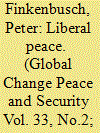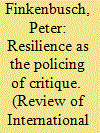| Srl | Item |
| 1 |
ID:
178400


|
|
|
|
|
| Summary/Abstract |
Focusing on post-Cold War international interventions, this article traces the emergence of a malaise within the liberal universal project. While it is agreed that the liberal peace is in crisis, there is disagreement on the nature of the impasse. For mainstream IR scholars, there is a resistance by actors in the Global South to follow the policy dictates of powerful Western governments and the international organisations they dominate. While this is certainly the case, this article argues that the crisis of the liberal peace is also rooted in the erosion of liberal universal foundations. In addition to liberal norms being rejected by Southern actors, the liberal peace crisis reflects a deeper scepticism on the part of international policy elites regarding the ability of liberal market democracy to resolve a wide range of social, political and economic problems. In addition to being a crisis of legitimacy between the Global North and the Global South, there seems to exist an erosion of liberal universal foundations which is undermining the ability of international policy elites to act purposively in global affairs. This argument is drawn out with reference to post-liberal approaches to peacebuilding which foreground the radical potential of non-liberal forms of agency.
|
|
|
|
|
|
|
|
|
|
|
|
|
|
|
|
| 2 |
ID:
193302


|
|
|
|
|
| Summary/Abstract |
This article offers a critical review of the main conceptual readings of resilience as a prominent policy paradigm in international development, security, and disaster management. Focusing on neoliberal, biopolitical, cybernetic, and postliberal understandings, it probes the possibilities for engaging in a socially transformative critique of resilience. In particular, the article asks how the resilience discourse polices critique in a way that includes certain forms of knowledge, such as indigenous, local, and everyday knowledge, while excluding abstract theorising. What is considered authoritative knowledge in the resilience discourse? And what are the possibilities for opposing resilience if it ‘metabolizes critique into its internal dynamic’, as Jeremy Walker and Melinda Cooper famously argued? How does critique turn from a tool to undermine dominant knowledge-power regimes into a motor of governance? The article demonstrates that the more seriously we engage with the underlying ontology of resilience, the more difficult it becomes to formulate a critique that is not incorporated into governance. As a possible way forward, the article discusses Luc Boltanski's pragmatist sociology of critique.
|
|
|
|
|
|
|
|
|
|
|
|
|
|
|
|